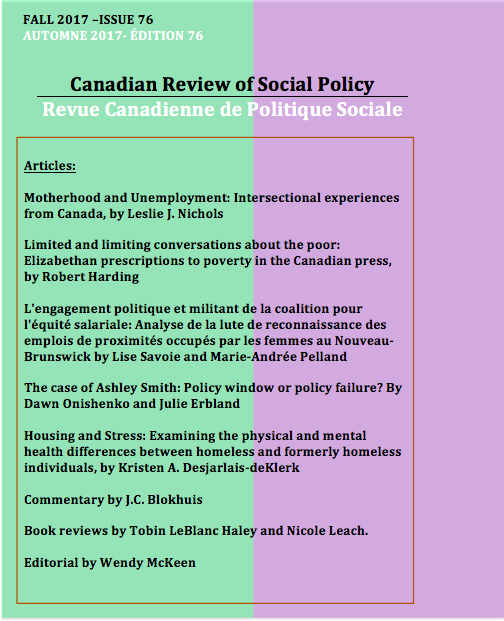Housing and Stress: Examining the physical and mental health differences between homeless and formerly homeless individuals
Mots-clés :
Housing First, Homelessness, Housing PolicyRésumé
This paper examines differences in physical and mental health between homeless individuals living in shelters, and formerly homeless individuals living in government-assisted housing. Utilizing Homelessness Management Information System (HMIS) data from Calgary, Canada, this study finds no significant difference in mental health between the two groups. However, regardless of housed status, past stress exposure negatively influences both current physical and mental health. Formerly homeless individuals in housing were more likely to report having a physical ailment compared to those in the homeless shelter. Furthermore, individuals in housing appear to have a greater exposure to stressors, yet their mental health is no worse than those in the homeless shelter. Housing may protect against the deleterious effects of cumulative stressors on current physical and mental health. This would appear to support the belief of Housing First policy, that access to housing is the first step to eliminating homelessness in an individual’s life.
Keywords: Housing First approach; Homelessness; Housing policy
Résumé
Cet article examine les différences en santé mentale et physique entre les personnes sans-abri et vivant dans des refuges pour les sans-abris, et les personnes qui auparavant étaient sans-abri et vivent présentement dans des logements subventionnés par le gouvernement. Cette étude utilise des données du Système d’information sur les personnes et les familles sans-abri de Calgary, Canada, pour conclure qu’il n’existe pas de différence significative en santé mental entre les deux groupes. Par contre, indépendamment de leur statuts de logement, avoir été exposé à des facteurs de stress dans le passé, affectait négativement la sante mentale et physiques des individus dans le présent. Les personnes vivants dans des logements subventionnés sont plus aptes à rapporter avoir des problèmes physiques comparer aux personnes vivants dans des refuges pour personnes sans-abri. De plus, les personnes vivants dans des logements subventionnés semblent avoir plus de facteurs de stress malgré le fait que leur santé mentale est tout aussi bonne que celle des personnes vivant dans des refuge pour personnes sans-abri. Avoir un logement pourrait protéger contre les effets néfastes des facteurs de stress cumulatifs sur la santé mentale et physique. Ces résultats semblent soutenir les politique suivant une approche « priorité au logement », qui propose qu’avoir accès a un logement est la première étape pour éliminer l’itinérance dans la vie des personnes sans-abri.
Mots-Clefs: Approche priorité au logement; itinérance; politique de logement
Publié-e
Comment citer
Numéro
Rubrique
Licence
1-The author guarantees that the manuscript is an original work not published elsewhere in print or electronically in whole or in part, except in abstract form, that the author has the full power to make this contribution, and that the manuscript contains no matter libelous or otherwise unlawful or which invades the right of privacy or which infringes any proprietary right.
2-The author guarantees that the manuscript has not been previously published in print or electronically and that if the manuscript contains any tables, figures or images fully reproduced or closely adapted from previously published material, the author must obtain the necessary permission from the author/publisher holding the original copyright prior to publication in CRSP. The author may be required to produce evidence of permission granted to CRSP’s editors.
3-As a condition of publication in CRSP, the author assigns all copyright to CRSP, including but not limited to the right to publish, republish, and otherwise distribute this manuscript in print, electronic, or other formats. As CRSP is a non-profit interdisciplinary scholarly journal, the author will receive no royalty or other monetary compensation for the assignment set forth in this agreement.
For the purpose of full disclosure, CRSP will not normally use the content provided by the author in a commercial venture, but for the purpose of disseminating the author’s content to as many readers as possible. For distribution, third parties engaging in commercial activities may be contracted to distribute the content globally, and such parties may make a profit out of the author’s content in their normal course of business. CRSP will not pay the author or reimburse the author in any form based on such commercial activities because the conduct of such commercial activities is outside the control of CRSP.
Any future reference to or use of this published material by the authors must acknowledge CRSP as the original place of publication.
PERMISSION REQUEST/ARCHIVING
Permission is given to author(s) receiving funding via Tri-Council Agencies, the Canadian Institutes of Health Research (CIHR), the Natural Sciences and Engineering Research Council of Canada (NSERC) and the Social Sciences and Humanities Research Council (SSHRC), to make their publications freely available in an Open Access repository within the stated deadline by the Tri-Council Agencies (12 months following publication). Archiving of publication must be a manuscript copy bearing none of the CRSP headers, footers or any other distinguishing marks. No links to the article on the CRSP website is permitted.
Permission requests from third parties to reproduce articles in part or full in academic/educational publications can be directed to the managing editor of CRSP, and will not be unreasonably denied.

